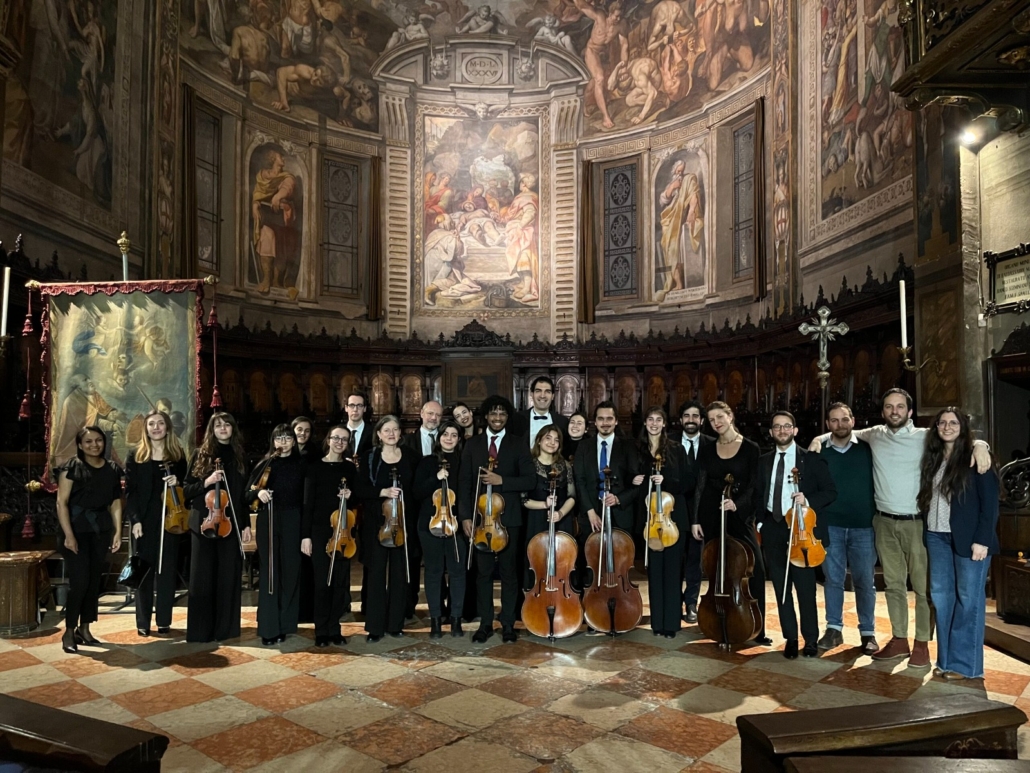Follow Enzo with music as well
“Enzo claimed that Giussani taught him how to be a surgeon, and Giussani was certainly not a doctor. So, no wonder Enzo taught us how to make music.”
This is acknowledged by siblings Emmanuele and Maria Bernadette Lo Russo, recalling that some friends (Enrico Tiozzo Bon, Ettore Soranzo and Luigi Liseno) encouraged them to take their musical vocation seriously. On this impetus, the social promotion association “Another Horizon” was born in August 2024, from which the Enzo Piccinini Orchestra later emerged.
Even before that, there had been a family very attentive to music: in addition to Emmanuele, violinist and conductor, the siblings Bernadette and Antonio, violin, and Raffaele, cello.
For a little over a year now, from time to time the Piccinini orchestra has performed in important concerts, bringing together musicians from all over Italy and abroad, who eventually also become friends with each other. The next event is at the Rimini Meeting on the evening of Aug. 25.
Emmanuele and Bernadette practice music professionally, both with a resume of awards and masterclasses from champions. Currently, after conducting prestigious orchestras on all continents, Emmanuele, with his wife Barbara Carrer, a pianist and soprano, runs a music school. Bernadette, after perfecting herself around the world, is part of the “Maggio Musicale Fiorentino” ensemble. Antonio and Raffaele, on the other hand, while continuing to love music and practice it intensely, have made different professional choices.
Emmanuele is a river of enthusiasm as he – along with Bernadette – recounts the depth behind the Piccinini Orchestra. They, Enzo never knew him in person, but through the passionate stories of some friends, they came into contact with his texts, his speeches, his videos, and “we discovered that Enzo enters into relationship with our whole life, because from him we learned that faith invests every aspect of existence. Thus was born our motto, ‘Meeting a beauty, living a totality.’ We want Enzo’s totality for us as well.”
The Piccinini Orchestra that will play at the Meeting will consist of a corps of about 25 strings from different locations and experiences. As is the practice in the orchestral world, there will be a“ guest backing violinist” in Rimini. She will be Albanian Fatlinda Thaci, from the orchestra “i pomeriggi musicali” from Milan. The Lo Russos have made the invitations, but there are also professional musicians who have proposed directly, having caught the spirit that permeates the ensemble.
“Our first goal,” Emmanuele and Bernadette continue, “is to play well, with professional rigor, but we add that we love those who come to play with us, and this is revealed in the care we have for people before and after concerts. It is important to give each other the reasons why we play together.” And they recount the episode of an old double bass player who, after meeting them in concert in Comacchio, confessed that they had brought back his desire to play, too often buried by “craft” and repetitive gestures.
On Aug. 25 at the Meeting, the Enzo Piccinini Orchestra will play Dvorak, the Serenade for Strings Op. 22. “We chose it,” explains maestro Lo Russo, “keeping in mind the title of the Meeting: ‘In deserted places we will build with new bricks.’ The Bohemian composer also teaches us this: to combine the experiences of different worlds (his native Eastern Europe and the West of the States, where he lived for years), merging them to the best advantage.”
In the Spirto Gentil Necklace (which collaborates on the Rimini Concert together with the Sagra Malatestiana) Don Giussani had commented on Dvorak’s Serenades as follows: “For the East, the dimension of the consciousness of the individual has the breadth of the people: the strength and security of man are in what is for all, for the people. There is no possibility of fully saying the word “I” except in a “we,” except within a people. Therefore, artistic expression, music, all culture is the event whose subject is the person insofar as he belongs to a people, the person who expresses in himself the consciousness of a people, who realizes and embodies in himself, translates the characteristic trait of that people.”
“Even in us,” Lo Russo concludes, “identifying with these geniuses and their music opens new spaces of humanity.
Read more:
https://www.emmanuelelorusso.com/it/orchestra-enzo-piccinini/
Lisa Bellocchi



